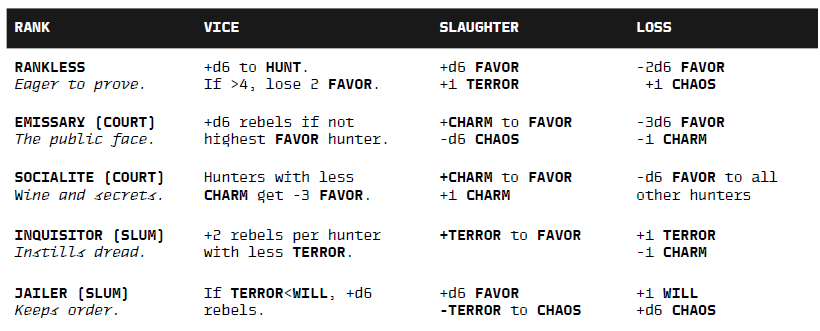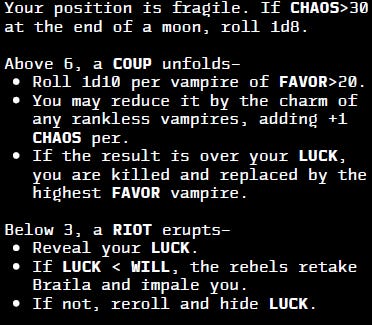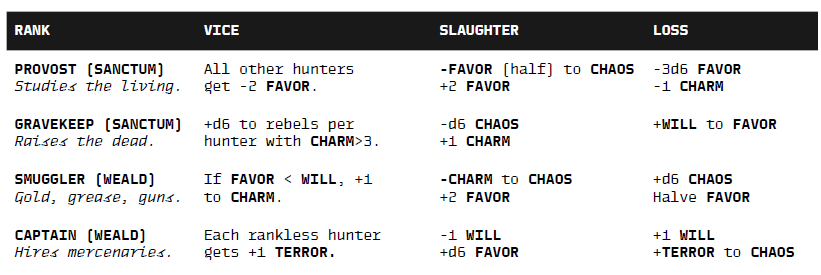We’ve toppled the Republic of New Braila, returning the nobles to their manors. VICEROY, you now rule in all but name. Secure the capitol city until Empress Carmilla’s return from Styria.
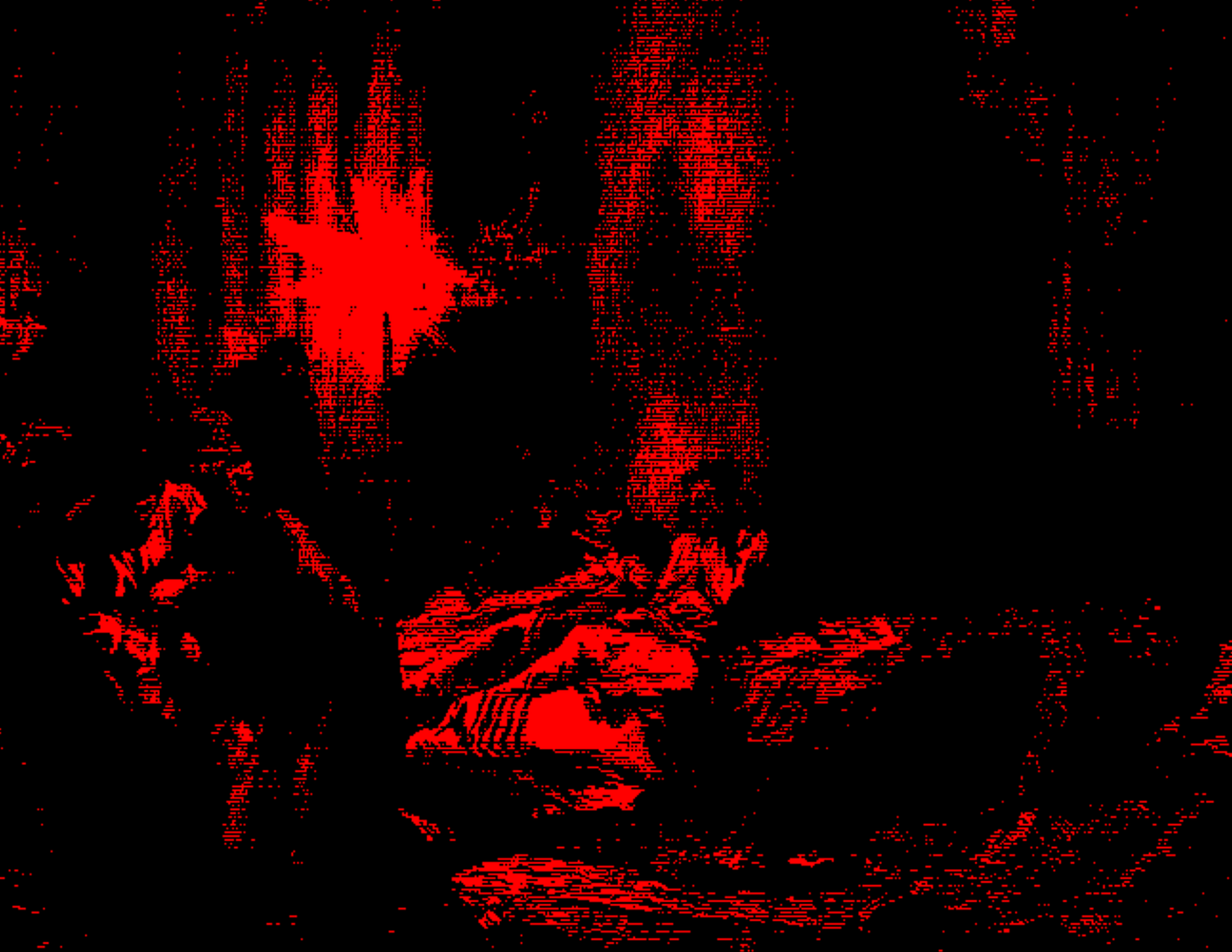
Back in August, I binged Castlevania: Nocturne and designed a tabletop game about backstabbing vampires. Their pride and bloodlust sow contradictions that make Braila’s liberation (and the player’s downfall) inevitable.
This is a postmortem on its design (full rules in the footnotes1).
overview
You oversee a coven of 8 vampires, each with varying—
[1-8] TERROR (ability to suppress rebellion),
[1-8] CHARM (ability to charm nobles),
and [>0] FAVOR (popularity with nobles)
Initially, each vampire’s CHARM and TERROR are random but sum to 82.
You’ll promote 4 vampires to ranks in your government. Every moon, you’ll call 1-4 vampires to send after rebels in The Hunt. Each rank changes how a vampire reacts to winning, losing, and being sidelined in the The Hunt.
For example, the Court Socialite causes all other hunters to lose d6 FAVOR when losing against rebels. The loss will also give rankless vampires FAVOR equal to their TERROR, as the nobility question your appointees’ competence.
Braila as a whole has—
If CHAOS erupts, you risk death either at the hands of rebels or your most popular vampires. So you’ll balance two growing problems— CHAOS in the city and FAVOR in your coven. Survival requires playing them off each other to buy time.
choices
You’ll face two main choices—
Who do I promote to ranks in government?
Who do I call to The Hunt?
The game’s mechanics entangle the pros-and-cons of each.
For example, after your first picks, promotion requires demoting a vampire. The demoted will lose FAVOR equal to their replacement’s CHARM, so you can embarrass them if your pick is charming enough.
But rebels will rejoice, and there’ll be +1 CHAOS for each vampire with less TERROR than the demoted. And if the demoted has more FAVOR than their replacement, they’ll add their CHARM to the CHAOS on their way out. Highly competent vampires are always costly to demote3.
the hunt
The rebels will roll 1d6 for every 10 CHAOS, adding their WILL to the sum as their strength. Your hunters’ strength will be the sum of their TERROR and the effect of any VICES based on their rank.
If the hunters’ strength is higher, they slaughter the rebels. Idle vampires will be humiliated, hunters will gain FAVOR, and the highest-TERROR hunter will gain additional FAVOR as they take credit.
If the rebels are stronger, the opposite happens. You can add a rankless vampire’s CHARM to the rebels’ strength to make that more likely4.
Every outcome helps somebody who you’ll struggle to rein in later. And every attempt at that (through demotion or The Hunt) will elevate someone else.
domains and multiplayer
There are two ranks per domain, which I used for scarce worldbuilding in a page filled with mechanics.
I also tried making it compatible for up to four players— though the balancing needs work5. In multiplayer, each player controls one domain’s promotions and can call6 one vampire to The Hunt.
Every moon, the vampire with more CHARM in each domain gains FAVOR— so letting a smooth-talker stay in power too long can be costly. When a player dies, the player whose ranking vampires have the least FAVOR takes over their domain7.
downfall
Let’s end at The Downfall.
LUCK is a d20 rolled before the game and placed under a cup. In a coup, every popular vampire moves against you (and in multiplayer, other players may move their ranking vampires against you too). You have slightly better odds with a riot.
If you survive, you have one moon to get CHAOS back under control to avoid another attempt on you. The game is (somewhat) balanced so that eventually, WILL, CHAOS, and FAVOR will accumulate faster than ability to limit them.
The vampires and their methods are simply too brutal, too destabilizing for humans —both noble and serf— to tolerate their rule forever. Who governs after you (and if they’ll last any longer) is a question better left to history8 than roleplay.
Stay.. sanguine! >:})
The full thing (+PDF download)—
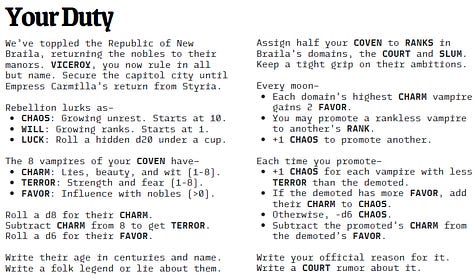
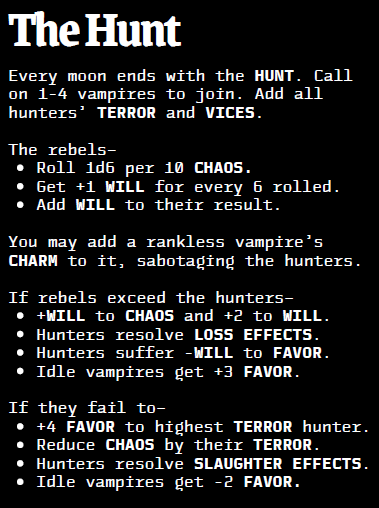
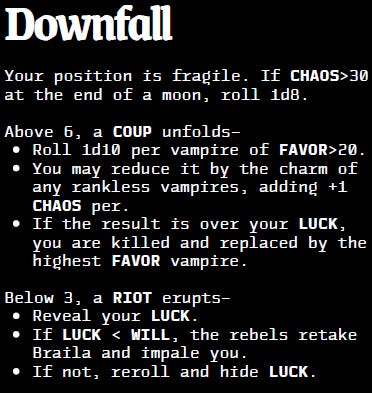
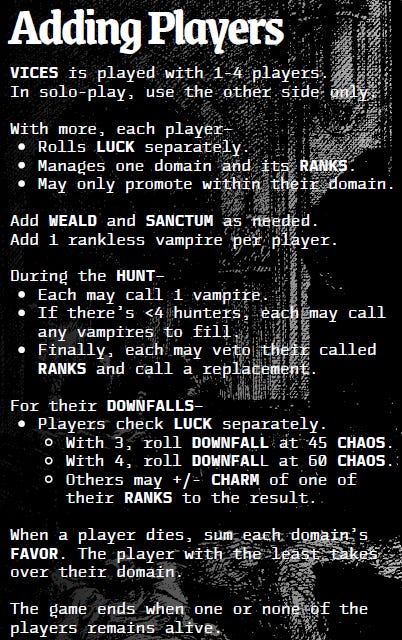
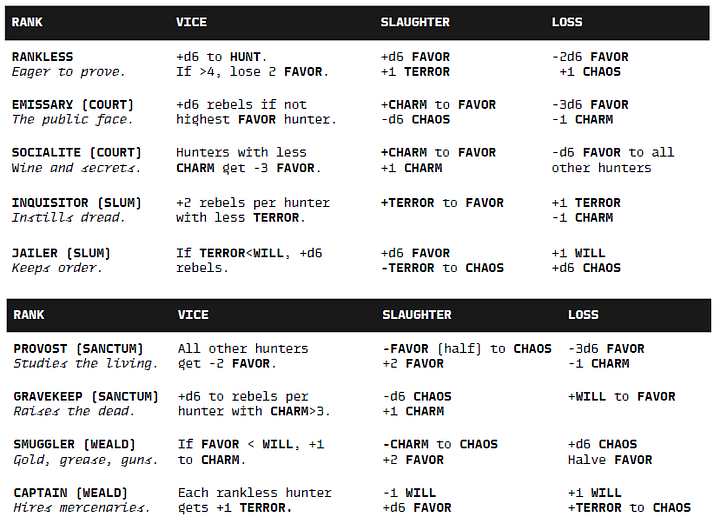
Like, at what point do you ask Caesar to step down? Relying on a vampire gives them power that’s hard to take back.
Maybe Alucard’s envy is more useful on the sidelines!
At its core I wanted to make a game about conflict within an unstable court whose only role is repression.
Being a game about crushing rebellion with terror, this obviously has a political slant. There are no mechanics showing the rebels doing wrong, no difference between them and the monolithic people of Braila. The nobility also have no agency— there are no dueling armies, militias, and mercenaries in the fray.
I’m working on a much bigger game about how political change happens, but I’m happy with this for now!

